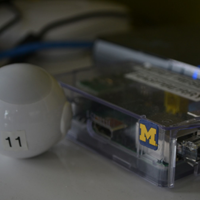
Michael Kallitsis
Research Scientist
Merit Network
The prototype uses machine learning techniques that process data For the past three years, researchers at Merit Network, University of Michigan and Eastern Michigan University have been collaborating with NextEnergy in the areas of cyber-security and situational awareness for the smart electric grid. The team has been leveraging NextEnergy’s smart home facility, NextHome, to design, build and operate a research prototype for detecting anomalies in the operation of the power grid. The project, funded by the National Science Foundation, aimed at developing an inexpensive, broadly accessible system for the task at hand. And how was this accomplished? By using Raspberry Pis and other off-the-shelf Internet-of-Things (IoT) devices.


(Left) A Raspberry Pi shown with one of the Z-Wave wireless sensors deployed within the house.
(Right) A team member within NextHome examining and analyzing the data collected.
The prototype uses machine learning techniques that process data collected in real-time from the NextHome to rapidly detect erratic behavior of the home’s “smart meter” (i.e., the next-generation metering and monitoring infrastructure deployed by utility companies such as DTE). In particular, the project goal was to identify a particular type of threat, referred to as a “false data injection attack”. In such attacks, the smart meter (which is really a small computing device with two-way communication capabilities) gets compromised by remote attackers who can arbitrarily alter (spoof) the power consumption/demand data reported by the smart meter to the utility company. If such “bad data” attacks ever happen in an orchestrated/coordinated manner, utility companies could be dealing with the danger of power outages. Can these meters be hacked that easily? Yes! Check [1], [2] to see what those researchers found out.
Our Raspberry-Pi-based prototype utilizes sensor data (such as data collected from Z-Wave wireless sensors talking to our Raspberry Pi’s — see Fig.1) to get measurements within the home for motion, noise, indoor and outdoor temperature, humidity, and more. This sensor information is then associated with the power consumption reported by the smart meter to our Raspberry Pi’s. The idea to detect meter anomalies at any given instance is simple: is the meter reporting higher (or lower) consumption levels than those that are usually associated with the residents’ activities within the house? For example, when everybody is sleeping and the sensors report no motion in the house, is the meter suddenly reporting abnormally high power consumption? For more information on our machine learning approach and our prototype, please see [3], [4].
While our prototype currently focuses on cyber-security, one can employ such smart-home monitoring systems for other applications. Our team has recently been exploring opportunities in the areas of energy saving and “demand response” schemes–examples of deployed demand response schemes include the Pacific Northwest demand response project (https://www.nwcouncil.org/energy/dr) and the New England demand response initiative (http://nedri.raabassociates.org). Further, such inexpensive monitoring systems can be proven beneficial and life-saving in alerting first responders to flooding, fires, gas-leakage, earthquakes, etc. incurred by extreme physical phenomena or other catastrophic events (see [5] as an example). If you are interested in learning more, and/or looking for opportunities for to collaborate, send us a message at ![]() .
.
References:
[1] Smart meters can be hacked to cut power bills, http://www.bbc.com/news/technology-29643276, (Last accessed, Sept. 30th, 2017)
[2] The 2015 Ukraine blackout: Implications for false data injection attacks, G. Liang, S. R. Weller, J. Zhao, F. Luo, and Z. Y. Dong, IEEE Transactions on Power Systems, vol. 32, no. 4, pp. 3317–3318, July 2017.
[3] Correlative monitoring for detection of false data injection attacks in smart grids, M. Kallitsis, S. Tout, G. Michailidis, 2015 IEEE International Conference on Smart Grid Communications (SmartGridComm), 2015. Online: http://ieeexplore.ieee.org/abstract/document/7436331/
[4] Diagnosing False Data Injection Attacks in the Smart Grid: a Practical Framework for Home-area Networks, A. Padin, Y. Kebede, M. Morgan, D. Vorva, A. Fozdar, R. Kalvaitis, N. Remley, S. Tout, M. Kallitsis, The 1st EAI International Conference on Smart Grid Assisted Internet of Things, 2017.
[5] Responding to disaster with IoT and SDN mesh, Jay Turner, 2016. [Online] https://techcrunch.com/2016/12/23/responding-to-disaster-with-iot-and-sdn-mesh/ (Last accessed, Sept. 30th, 2017)
About Merit Network, Inc.
Merit Network is a non-profit, Member-owned organization governed by Michigan’s public universities. Founded in 1966, Merit owns and operates America’s longest-running regional research and education network. After 50 years of innovation, Merit continues to provide high-performance services to the educational communities in Michigan and beyond. Merit continues to leverage its experience managing NSFNET, the precursor to the modern Internet, to catapult Michigan into the forefront of networking technologies. Through Merit, organizations have access to leading-edge network research, state and national collaborative initiatives and international peering.